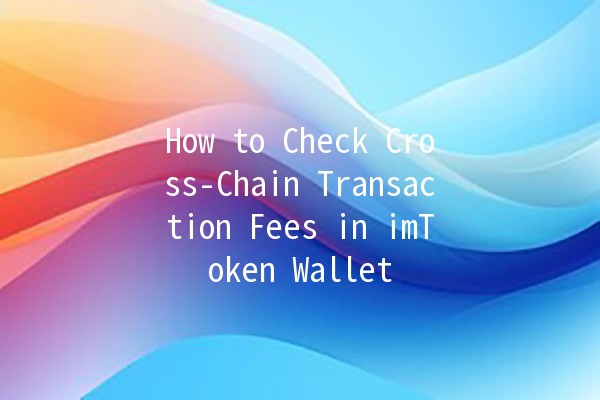With the increasing use of cryptocurrencies and decentralized finance (DeFi) platforms, managing crosschain transactions has become essential for crypto enthusiasts. The imToken wallet, a popular choice among users, provides functionalities to store, manage, and transfer various cryptocurrencies with ease. One critical aspect of using the imToken wallet is understanding the fees associated with crosschain transactions. This article will guide you on effectively checking crosschain transaction fees in the imToken wallet and provide practical tips to enhance your productivity while using this platform.
Crosschain transactions refer to transfers of assets or data between different blockchain networks. For example, you might want to move ERC20 tokens from the Ethereum blockchain to the TRC20 format on the TRON blockchain. This process often involves fees that can vary based on several factors, including network congestion and the chosen intermediary service.

Transaction fees are necessary to incentivize miners or validators to include your transaction in the blockchain. Services that handle crosschain transactions often charge additional fees for their role in facilitating the transfer. Therefore, understanding these fees is crucial for effective asset management and budgeting within your crypto operations.
To check the fees associated with crosschain transactions in imToken, follow these steps:
Launch the imToken wallet application on your device. Ensure you have the latest version to access all functionalities and optimized features.
Once you're in the wallet interface, look for the "Swap" or "Transfer" options. Depending on the version of imToken, the naming conventions may vary. Click on the relevant option (that's usually labeled as “CrossChain Transfer”).
Choose the specific tokens you want to transfer from the dropdown menu. You will also need to select the originating and the target blockchain networks for your transaction.
Before confirming your transaction, imToken will provide an estimated fee breakdown for the transfer. This information typically shows:
Network Fees: Fees required by the blockchain.
Service Fees: Additional fees charged by imToken or the service facilitating the crosschain transaction.
Make sure to review this fee structure before proceeding, as it will help you make informed decisions about your transactions.
After ensuring that the fees are acceptable, proceed with the transaction. Always remember that network conditions can change rapidly, leading to fluctuating fees even within minutes.
To enhance your awareness of transaction fees, consider using fee tracking tools. Websites like Blockchair and Etherscan provide uptotheminute data about current average transaction fees on various networks. This information can help you time your transactions for lower fees.
Example: You could identify times of day when transaction fees are consistently lower and plan your crosschain transactions accordingly.
Fees can sometimes be reduced by adjusting the amount of tokens you transfer. For small amounts, the network fees might be disproportionately high. Consider consolidating multiple small transactions into one larger transaction to save on overall fees.
Example: Instead of moving 100 tokens in five separate transactions, consolidate them into one transaction, potentially saving on cumulative fees.
Some blockchain networks offer lower fees and faster transactions compared to others. If you frequently perform crosschain transfers, consider using highspeed networks that support your tokens.
Example: Using Binance Smart Chain (BSC) for ERC20 tokens can often yield lower fees compared to Ethereum during peak times.
Cryptocurrencies are dynamic, and events like hard forks, network congestion, or major upgrades can affect transaction fees. Follow developments in the blockchain space to stay informed about potential fee fluctuations.
Example: Understanding when network updates are scheduled can help you avoid high fees that often occur during such times.
Some wallets and platforms offer fee discounts for users who hold specific tokens or maintain certain balances. Check if imToken has any ongoing promotions or incentives regarding fees for crosschain transactions.
Example: Users holding a certain amount of imTokennative tokens may receive a discount or cashback on transaction fees.
The fees for crosschain transactions are influenced by several factors, including network congestion, the complexity of the transaction, and the intermediary services used for the transfer. Higher congestion typically leads to increased fees, as users bid to have their transactions prioritized.
You can minimize transaction fees by timing your transactions during offpeak hours, consolidating smaller transactions into larger ones, and choosing highspeed networks known for lower fees. Keeping an eye on blockchain news can also help you avoid spikes in fees due to unexpected network congestion.
Yes, fees can vary significantly between different blockchain networks. Each blockchain has its fee structure based on demand, usage, and the underlying technology. For example, Ethereum typically has higher fees compared to Binance Smart Chain due to its larger user base and higher transaction volume.
While imToken provides realtime fee estimates, it does not typically offer historical fee trends. Users can utilize external blockchain explorers like Etherscan to view historical fee data and patterns over time, aiding in decisionmaking for future transactions.
If you notice exceptionally high fees, it may be due to network congestion. You can either wait for a lower congestion period or, in some cases, submit a transaction with a lower estimated fee, though it may take longer to be confirmed or could remain pending for an extended period.
Yes, imToken is generally considered secure for crosschain transactions. However, as with any digital wallet, users must follow best practices for security. Make sure to keep your wallet updated, use twofactor authentication, and store your recovery phrases securely.
Understanding how to check and manage crosschain transaction fees in the imToken wallet is vital for any cryptocurrency user looking to optimize their asset management strategy. By monitoring fees effectively and employing the productivity tips outlined in this article, you can enjoy a streamlined and costefficient experience while navigating the exciting world of crosschain transactions. Managing your assets wisely can enhance your overall engagement with the cryptocurrency ecosystem!